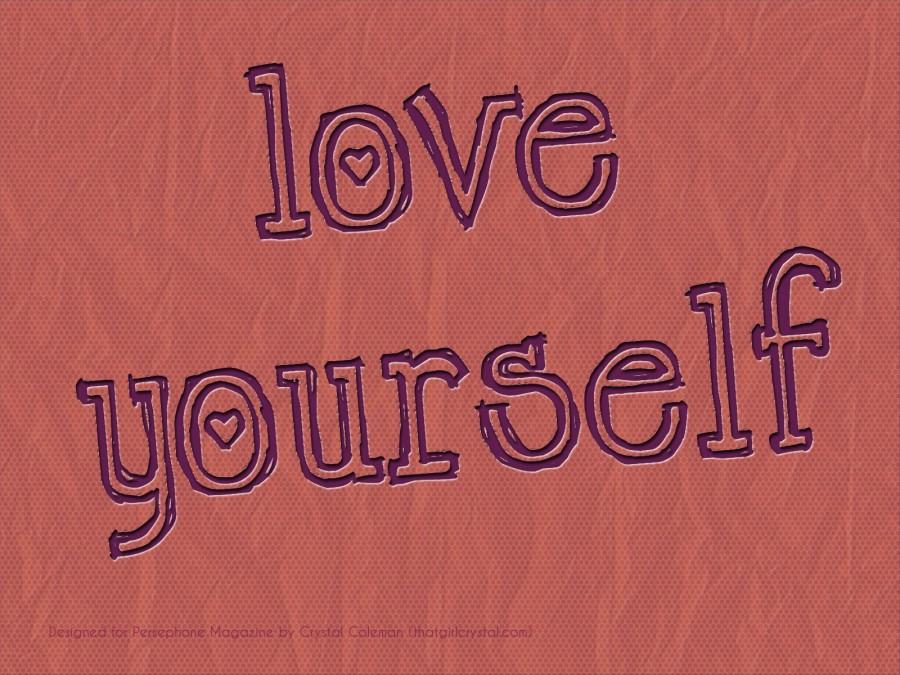OPINION: How about healthy positivity?
March 3, 2016
“Fat and Happy,” a sign posted in the SURC reads, but I’m not looking at the sign. Like everyone else, I’m looking at the five regular people standing behind it.
They’re stripped to their underwear, faceless behind masks and blindfolds. People shuffle through as usual.
A clothed passer-by stops. She carefully places a hand on one of the exposed shoulders, writing with colored marker. The girl being written on nervously squeezes her fists.
“You are beautiful.”
Lady Gaga’s “Born This Way” plays joyfully and loudly. This wants to be a celebration.
Some of us believe that to deserve love, even from ourselves, we have to look, laugh and act in certain ways that are largely impossible.
We know that these standards are untainable, yet we still desire them. The world is full of ironies.
The “fat and happy” young woman behind the sign shifts her exposed weight, favoring one hip and then the other. She can’t see the dumb smirks and raised eyebrows that pass by her.
It occurs to me this exhibition is lurid, and I feel icky seeing it.
Walking away, it occurs to me that America’s heaviest people are also often the poorest.
It’s less expensive and more profitable to produce food that is merely calorie dense, as opposed to nutrient dense. The poorest of us tend to have to eat the cheapest foods, which are fatty, sugary and processed.
If two people interview for the same job, completely equal in all other areas, the thinner of those two will likely get the job and the money that comes with it.
Poverty begets obesity; obesity begets poverty.
In our finer moments, we want to be inclusive and kind, which is good. But the fact is we are a nation of fat people, and where it counts, we discriminate like holy hell against fat people.
However you slice it, this does not add up to “fat and happy,” let alone fat and healthy.
This isn’t about about shaming anyone, but addressing a problem.
When we call the symptom of our problem beautiful—with whatever intentions—we turn away from facing down the problem itself.
We become the problem’s ideological supplement. The rich get richer, and we get fatter and sicker until we die.



Ali Gothard • Mar 3, 2016 at 4:08 pm
Fat does not equal sick, and thin does not equal healthy. Thin people who develop diabetes are usually much sicker than fat people with it, because fat has been found to be protective against insulin intolerance. Also, thin people are usually assumed by doctors and themselves) to be healthy, and so end up getting very very sick before their serious illnesses are noticed. Meanwhile, fat people frequently endure many unnecessary tests because doctors always assume they must have diabetes, high blood pressure, heart problems, and so on. Doctors get really upset when fat people have good test results!
While I agree with you about the need to make nutrient-dense food more affordable in order to improve the health of the poor, your insistence that fat is a sign of a problem is a sign of your ignorance of modern scientific findings. The BMI was developed in the mid-1800s, a time when bloodletting was commonly practised, medical problems were thought to be caused by an excess of the four humours or by foul odours, and antibiotics and vaccines didn’t exist. In fact, at the time it was considered a strange new idea that washing hands could prevent infections. We have come a long way since then, but unfortunately people hang onto BMI because of society’s perception that fat is ugly, unhealthy, and a sign of poor character. It’s time for people to catch up with modern science and stop bashing themselves and others for having the bodies they have.
Marilyn Wann • Mar 3, 2016 at 3:36 pm
Setting aside the weight bigotry of this writer, I’d love to know more about the public action that is described here! Big fat congratulations to students who raised awareness about fat pride and body positivity. I hope the writer of this opinion piece will read about the Health At Every Size approach, a data-based companion to fat rights activism.
Marilyn Wann, FAT!SO? author